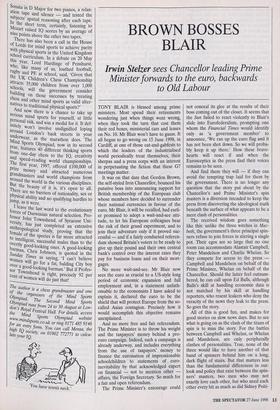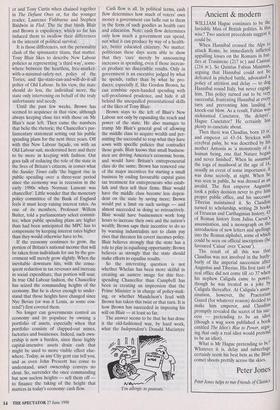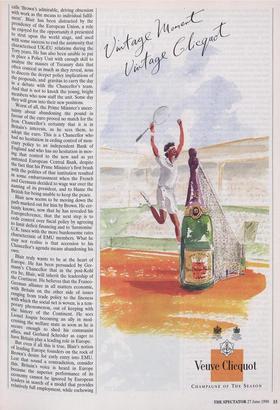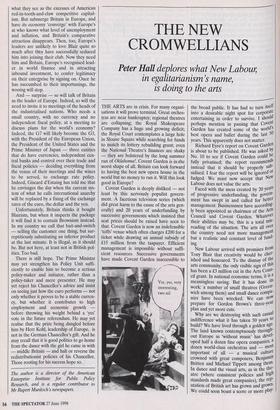BROWN BOSSES BLAIR
Irwin Stelzer sees Chancellor leading Prime
Minister forwards to the euro, backwards to Old Labour
TONY BLAIR is blessed among prime ministers. Most spend their retirements wondering just when things went wrong, when they took the turn that cost them their red boxes, ministerial cars and leases on No. 10. Mr Blair won't have to guess. It all began to go wrong on 15 June 1998, in Cardiff, at one of those eat-and-gabfests to which the leaders of the industrialised world periodically treat themselves, their sherpas and a press corps with an interest in perpetuating the fiction that these G7 meetings matter. It was on that date that Gordon Brown, the self-styled Iron Chancellor, bounced his putative boss into announcing support for British membership of the European club whose members have decided to surrender their national currencies in favour of the euro. Mr Blair, it will be recalled, had earli- er promised to adopt a wait-and-see atti- tude, to let his European colleagues bear the risk of their grand experiment, and to join their adventure only if it proved suc- cessful — and if a fairly conducted referen- dum showed Britain's voters to be ready to give up their pound and their own central bank's control over the interest rates they pay for business loans and on their mort- gages. No more wait-and-see. Mr Blair now sees the euro as crucial to a US-style long period of economic expansion and full employment and, in a statement unfath- omable to the economists I have asked to explain it, declared the euro to be the shield that will protect Europe from the so- called Asian contagion. Precisely how it would accomplish this objective remains unexplained. And no more free and fair referendum. The Prime Minister is to throw his weight and the taxpayers' money behind a pro- euro campaign. Indeed, such a campaign is already underway, and includes everything from the use of taxpayers' money to finance the euroisation of impressionable schoolchildren to statements of euro- inevitability by that acknowledged expert on financial — not to mention other affairs, the Foreign Secretary. So much for a fair and open referendum. The Prime Minister's entourage could not conceal its glee at the results of their boss coming out of the closet. It seems that the Sun failed to react violently to Blair's slide into Eurofederalism, prompting one whom the Financial Times would identify only as 'a government member' to announce, 'We ran up the euro flag and it has not been shot down. So we will proba- bly keep it up there.' How these brave- hearts will react if and when the Eurosceptics in the press find their voices remains to be seen.
And find them they will — if they can avoid the tempting trap laid for them by the government. There is no longer any question that the story put about by the Chancellor's and Prithe Minister's spin masters is a diversion intended to keep the press from discovering the ideological truth beneath the surface of what appears to be a mere clash of personalities.
The received wisdom goes something like this: unlike the three witches in Mac- beth, the government's three principal spin- ners refuse to join forces in stirring a single pot. Their egos are so large that no one room can accommodate Alastair Campbell, Peter Mandelson and Charlie Whelan. So they compete for access to the press Campbell and Mandelson on behalf of the Prime Minister, Whelan on behalf of the Chancellor. Should the latter feel outnum- bered, he can call upon Ed Balls, although Balls's skill at handling economic data is not matched by his skill at handling reporters, who resent leakers who deny the veracity of the news they leak to the press. So goes the story. All of this is good fun, and makes for good stories on slow news days. But to see what is going on as the clash of the titans of spin is to miss the story. For the battles between Campbell and Whelan, or Whelan and Mandelson, are only peripherally clashes of personalities. True, none of the three would like to have another of that band of spinners behind him on a long, dark flight of stairs. But that matters less than the fundamental differences in out- look and policy that exist between the spin- ners' masters, two men who may not exactly love each other, but who need each other every bit as much as did Sidney Poiti- er and Tony Curtis when chained together in The Defiant Ones or, for the younger reader, Laurence Fishburne and Stephen Baldwin in Fled. The tie that binds Blair and Brown is expediency, which so far has induced them to swallow their differences in the interest of political survival.
It is those differences, not the personality clash of the spinmaster titans, that matter. Tony Blair likes to describe New Labour policies as representing 'a third way', some- where between the heartless, free-market- with-a-minimal-safety-net policy of the Tories, and the-state-can-and-will-do-it-all policy of Old Labour. In his view, the state should do less, the individual more, the state only intervening on behalf of the truly unfortunate and needy.
Until the past few weeks, Brown has seemed to acquiesce in that view, although always keeping close ties with those on Mr Blair's near left. Then came the numbers that belie the rhetoric, the Chancellor's par- liamentary statement setting out his public spending plans for the next three years. Off with this New Labour façade, on with an Old Labour suit, modernised here and there to be more in keeping with fashion. Out goes talk of reducing the role of the state in the lives of Britain's citizens, in comes what the Sunday Times calls 'the biggest rise in public spending over a three-year period since the economy was in recession in the early 1990s when Norman Lamont was chancellor'. Little wonder that the monetary policy committee of the Bank of England feels it must keep raising interest rates. As one of its members, Professor Willem Buiter, told a parliamentary select commit- tee, when public spending plans are higher than had been anticipated the MPC has to compensate by keeping interest rates higher than they would otherwise have to be.
If the economy continues to grow, the portion of Britain's national income that will be taken from individuals for use by the gov- ernment will merely grow slightly. When the inevitable downturn hits, with the conse- quent reduction in tax revenues and increase in social expenditure, that portion will soar. In true Old Labour fashion, the Chancellor has seized the commanding heights of the economy. But he is clever enough to under- stand that those heights have changed since Nye Bevan (or was it Lenin, as some con- tend?) first coveted them.
No longer can governments control an economy and its populace by owning a portfolio of assets, especially when that portfolio consists of clapped-out mines, factories and businesses. Indeed, such own- ership is now a burden, since these highly capital-intensive assets drain cash that might be used to more visible effect else- where. Today, as any City gent can tell you, and as even John Prescott has come to understand, asset ownership conveys no clout. So, surrender the once commanding but now useless heights — sell them off to finance the taking of the height that matters in today's economy: cash flow. Cash flow is all. In political terms, cash flow determines how much of voters' own money a government can ladle out to them in the form of such goodies as health care and education. Note: cash flow determines only how much a government can spend, not what it can produce by way of a health- ier, better educated citizenry. No matter: politicians these days seem able to show that they 'care' merely by announcing increases in spending, even if those increas- es produce no discernible results. Only in government is an executive judged by what he spends, rather than by what he pro- duces; especially if, like Gordon Brown, he can combine open-handed spending with self-proclaimed prudence, and hide it all behind the unequalled presentational skills of the likes of Tony Blair.
Brown stays to the left of Blair's New Labour not only by expanding the reach and power of the state. He also manages to trump Mr Blair's general goal of allowing the middle class to acquire wealth and per- mitting the successful to reap what they have sown with specific policies that contradict those goals. Blair knows that small business- men are driving America's economic boom, and would have Britain's entrepreneurial class do the same; Brown has removed one of the major incentives for starting a small business by ending favourable capital gains tax treatment for entrepreneurs who estab- lish and then sell their firms. Blair would have the middle class become less depen- dent on the state by saving more; Brown would put a limit on such savings — and almost succeeded in doing so retroactively. Blair would have businessmen work long hours to increase their own and the nation's wealth; Brown saps their incentive to do so by warning industrialists not to claim pay rises that threaten his covert incomes policy. Blair believes strongly that the state has a role to play in equalising opportunity; Brown believes as strongly that the state should make efforts to equalise results.
So the interesting question is not whether Whelan has been more skilful in creating an austere image for this free- spending Chancellor than Campbell has b6en in creating an impression that the Prime Minister is in charge of policy-mak- ing, or whether Mandelson's feud with Brown has taken this twist or that turn. It is how Brown has succeeded in imposing his will on Blair — at least so far.
The answer seems to be that he has done it the old-fashioned way, by hard work, what the Independent's Donald Macintyre 'I'm allergic to peanuts.' calls 'Brown's admirable, driving obsession with work as the means to individual fulfil- ment'. Blair has been distracted by the presidency of the European Union, a role he enjoyed for the opportunity it presented to strut upon the world stage, and used with some success to end the animosity that characterised UK-EU relations during the Tory years. He has also been unable to put in place a Policy Unit with enough skill to analyse the masses of Treasury data that often conceal as much as they reveal, nous to discern the deeper policy implications of the proposals, and gravitas to carry the day in a debate with the Chancellor's team. And that is not to knock the young, bright members who now staff the unit. Some day they will grow into their new positions. Worst of all, the Prime Minister's uncer- tainty about abandoning the pound in favour of the euro proved no match for the Iron Chancellor's certainty that it is in Britain's interests, as he sees them, to adopt the euro. This is a Chancellor who had no hesitation in ceding control of mon- etary policy to an independent Bank of England and who has no hesitation in mov- ing that control to the new and as yet untested European Central Bank, despite the fact that his Prime Minister's first brush with the politics of that institution resulted in some embarrassment when the French and Germans decided to wage war over the naming of its president, and to blame the British for being unable to keep the peace. Blair now seems to be moving down the path marked out for him by Brown. He cer- tainly knows, now that he has revealed his Europreference, that the next step is to cede control over fiscal policy by agreeing to limit deficit financing and to 'harmonise' U.K. taxes with the more burdensome rates characteristic of EMU members. What he may not realise is that accession to his Chancellor's agenda means abandoning his own.
Blair truly wants to be at the heart of Europe. He has been persuaded by Ger- many's Chancellor that in the post-Kohl era he, Blair, will inherit the leadership of the Continent. He believes that the Franco- German alliance in all matters economic, with Britain on the other side of issues ranging from trade policy to the fineness with which the social net is woven, is a tem- porary phenomenon, out of keeping with the history of the Continent. He sees Lionel Jospin becoming an ally in mod- ernising the welfare state as soon as he is secure enough to shed his communist allies, and Gerhard Schroder as eager to have Britain play a leading role in Europe. But even if all this is true, Blair's notion of leading Europe founders on the rock of Brown's desire for early entry into EMU. Lest that sound a contradiction, consider this. Britain's voice is heard in Europe because the superior performance of its economy cannot be ignored by European leaders M search of a model that provides relatively full employment, while eschewing what they see as the excesses of American red-in-tooth-and-claw competitive capital- ism. But submerge Britain in Europe, and have its economy 'converge' with Europe's at who knows what level of unemployment and inflation, and Britain's comparative attraction disappears. Then, too, Europe's leaders are unlikely to love Blair quite so much after they have successfully seduced him into joining their club. Now they need him and Britain, Europe's recognised lead- er in world finance and in attracting inbound investment, to confer legitimacy on their enterprise by signing on. Once he has succumbed to their importunings, the wooing will stop.
And — surprise — so will talk of Britain as the leader of Europe. Indeed, so will the need to invite it to meetings of the heads of the industrialised nations. Who needs a small country, with no currency and no independent fiscal policy, at a meeting to discuss plans for the world's economy? Indeed, the G7 will likely become the G3, with the President of the European Union, the President of the United States and the Prime Minister of Japan — three entities that do have currencies, independent cen- tral banks and control over their trade and fiscal policies — deciding everything from the venue of their meetings and the wines to be served, to exchange rate policy. Indeed, Giscard d'Estaing has told me that he envisages the day when the current sys- tem of what he calls international anarchy will be replaced by a fixing of the exchange rates of the euro, the dollar and the yen.
Unfortunately, Britain thinks it bought Blairism, but when it inspects the package it will find it to contain Brownism instead. In my country we call that bait-and-switch — selling the customer one thing, but sur- reptitiously substituting an inferior product at the last minute. It is illegal, as it should be. But not here, at least not in British pol- itics. Too bad.
There is still hope. The Prime Minister may yet strengthen his Policy Unit suffi- ciently to enable him to become a serious policy-maker and initiator, rather than a policy-taker and mere presenter. He may yet reject his Chancellor's advice and insist on seeing just how the euro performs — not only whether it proves to be a stable curren- cy, but whether it contributes to high employment and economic growth before throwing his weight behind a 'yes' vote in the future referendum. He may yet realise that the prize being dangled before him by Herr Kohl, leadership of Europe, is not in the German Chancellor's gift. And he may recall that it is good politics to go home from the dance with the girl he came in with — middle Britain — and halt or reverse the redistributionist policies of his Chancellor. Those rooting for his success hope so.
The author is a director of the American Enterprise Institute for Public Policy Research, and is a regular contributor to Mr Rupert Murdoch's newspapers.





























































 Previous page
Previous page